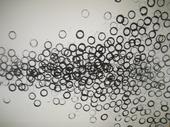Last month, our story finished with a demonstration of how imagination is already quite active in how we create knowledge. However, these days, its participation is overshadowed by its dominant sibling, reason. Rational examination receives the lion’s share of recognition in how we humans “know” anything. However, this was not always the case.
Human knowledge began as an oral tradition. This tradition was rich with metaphor, myth and symbol – all are used to help the listener receive a certain “knowing” about what it is to be alive and a part of this world. As I demonstrated in the last post, it is the imagination that enables us to extract knowledge from myth, metaphor and symbol. We did not lose this system of “knowing” with the written word; however, as we will see by the end of this post, with time, especially here in the West, it does eventually get squeezed out.
Imagination is effective with symbol, metaphor and myth because they all rely on the mystical as their center. There is an “unknowing” inherent with each of them. There is not a “certain” truth within any of them, but a living relationship between the words (or design) and the listener/reader. The mystical is the pure mystery –that which exceeds all our categories of thought, in other words, the purely Unknowable. Imagination, myth, metaphor and symbol all radiate from this unknowing – they are all trying to express that which cannot be said directly. Imagination is the ability to draw knowledge from a recognition of this mystical core.
Reason is often seen as the exact opposite. People generally assume that reason is not based on this purely Unknowable, but instead is situated on sure and solid ground. (The last two posts went into detail in order to show that this is not the case. Reason has no sure footing.) Here is the surprise. We did not always view reason this way. It, too, aligned with imagination, was seen to have a mystical center. Even as late as the birth of this nation, reason was seen as having a mystical core.
How did that change?
One key factor comes from the change in our concept God. “God” once upon a time signified pure mystery. Now, the dominant concept God is something that can be known, “I know God, he is that perfect human, a loving father, a man with a plan, maybe even an old guy with a long white beard. That’s what God is.”
This shift in the concept of God has altered our sense of reason. The phrase “God is the eye of reason” common in the 1700s (just look at your dollar bill and see the top eye at the top of the pyramid) delivers a very different message if “God” is a knowable concept, than it delivers if “God” is the symbol for divine mystery. God as a knowable concept covers over that mystery is at the core of reason , it covers over that the heart of reason is a leap of faith, not certainty.
So now, not only is reason seen as the opposite of imagination, but reason is misunderstood and regarded as some sort of antidote to pure mystery. We take the findings from our rational inquiries and we build “the truth” and we hold up the banner of truth (I know what is going on here!) to cover over the much more challenging and possibly more enriching aspect of being alive as humans: We don’t know what the heck is going on here! ALL ways of knowing depend upon pure mystery in order to generate any story, any “truth”. Underneath all our “truths” remains the Unknowable. The Mystery. The Mystical.
This post is an invitation to no longer misunderstand reason. Reasoning and rational inquiry and beautiful! But they do not and cannot deliver any “knowledge” without relying on the mystical. Reason, in itself, acknowledges the mystical. It is our misperception of it that has buried the mystical from our sight. It is our misperception of reason that has pitted it against imagination. It is our misperception of reason that has led to a devaluation of imagination. It is our misperception of reason that has drained our world of much of the beauty and “juice” that comes from acknowledging the pure mystery of being alive as these weird reflective creatures.
So, now you’re probably wondering, “Kjirsten, what do I do? I don’t want my life dried and devoid of the juiciness that acknowledging the mystical can bring me. A little help here?
Here you go!
- Remind yourself that all your knowledge has no sure base. Be kind, aim to see how other people’s points of view developed. Allow yourself to feel their path.
- Don’t take everything so literally. Let your imagination exercise itself. All our stories (academic, religious, pop cultural, etc.) are expressions that can be taken as metaphors, as symbols, as myths – stories that deliver “truths” about the human experience hidden in the words, not from the claims of the words themselves.
- Come to Visage, 1046 NW Johnson, on Monday, August 10th. Doors open at 7:30pm. At 8pm or so, I’ll be talking about the magic of words beyond their logical, rational, and literal functions. And there will be about five or six new pieces hanging on the walls! I’d love some company!
